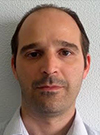
Contributions
Abstract: EP1584
Type: Poster Sessions
Abstract Category: Therapy - Immunomodulation/Immunosuppression
Background: long-term effectiveness data shows that more than two cycles of alemtuzumab (Alem) are often required to treat some multiple sclerosis (MS) patients. Cases of activation of the disease occurring in the first years of treatment are increasing.
Methods: We retrospectively studied a court of 15 MS patients starting therapy with Alem between August 2015 and March 2017 at the Multiple Sclerosis Center of Montichiari, Brescia and at the Multiple Sclerosis Center of Treviso (Italy).
Results: all 15 patients received 2 treatment courses at a 12-month interval with a mean follow-up from second Alem treatment cycle of 11 (5-19) months. Patients had a median disease duration of 7.5 years and they switched to Alem from other DMTs (natalizumab: 6, fingolimod: 4, dimethyl fumarate: 2, interferon beta-1a: 2) for treatment failure. Overall, 9 subjects experienced lack of response to Alem with clinical and/or radiological disease activity after the first therapeutic course (MRI activity after mean 7,8 months from treatment; relapses after mean 8,2 months from treatment). Two of them (showing a less active disease before Alem start) stabilized after the second treatment course, 6 patients lacked the full control of the disease after the second course. Two patients with clinical and radiological stability after the first cycle, reactivated after the second one, in contrast with reported data of possible uselessness of second Alem course in case of MS stabilization during the first year. In our patients the relapse-rate was 0.75/year after the first course of Alem and 0.33/year after the second one. Autoimmunity was observed 11 months after the first course in one patient (thyroiditis), 11 months after the second course in two patients (thyroiditis and eczema) and 13 months after the second course in one patient (alopecia, arthralgia).
Conclusions: high proportion of our highly active MS patients treated with Alem failed a complete response after the first and/or the second treatment course. Autoimmunity was observed precociously in 4/15 patients. The immunological profile at baseline and during treatment (kinetic of B and T cells recovery) could condition the efficacy of the drug, the risk of autoimmunity developement or suggest a different administration schedule.
Disclosure: Cinzia Cordioli: advisory board and/or speaker honoraria and travel grants from Novartis, TEVA, Biogen, Merck Serono, Genzyme, Roche.
Nicola De Rossi: speaker honoraria from Biogen Idec, Genzyme, Novartis, Sanofi-Aventis; received funding for participation in advisory board to Novartis and Genzyme-Sanofi and for travel to scientific meetings from Biogen Idec, teva, Sanofi-Genzyme, Roche, Almirall and Novartis.
Chiara Mancinelli: nothing to disclose.
Sarah Rasia: consulting fees from Novartis.
Marika Vianello: consulting services or speaking from Biogen, Novartis, Merk Serono.
Diego Bertoli: nothing to disclose
Ruggero Capra: lecture fees and/or travel grants from Novartis, Biogen, Celgene, Novartis, TEVA, Genzyme and Sanofi-Aventis.
Abstract: EP1584
Type: Poster Sessions
Abstract Category: Therapy - Immunomodulation/Immunosuppression
Background: long-term effectiveness data shows that more than two cycles of alemtuzumab (Alem) are often required to treat some multiple sclerosis (MS) patients. Cases of activation of the disease occurring in the first years of treatment are increasing.
Methods: We retrospectively studied a court of 15 MS patients starting therapy with Alem between August 2015 and March 2017 at the Multiple Sclerosis Center of Montichiari, Brescia and at the Multiple Sclerosis Center of Treviso (Italy).
Results: all 15 patients received 2 treatment courses at a 12-month interval with a mean follow-up from second Alem treatment cycle of 11 (5-19) months. Patients had a median disease duration of 7.5 years and they switched to Alem from other DMTs (natalizumab: 6, fingolimod: 4, dimethyl fumarate: 2, interferon beta-1a: 2) for treatment failure. Overall, 9 subjects experienced lack of response to Alem with clinical and/or radiological disease activity after the first therapeutic course (MRI activity after mean 7,8 months from treatment; relapses after mean 8,2 months from treatment). Two of them (showing a less active disease before Alem start) stabilized after the second treatment course, 6 patients lacked the full control of the disease after the second course. Two patients with clinical and radiological stability after the first cycle, reactivated after the second one, in contrast with reported data of possible uselessness of second Alem course in case of MS stabilization during the first year. In our patients the relapse-rate was 0.75/year after the first course of Alem and 0.33/year after the second one. Autoimmunity was observed 11 months after the first course in one patient (thyroiditis), 11 months after the second course in two patients (thyroiditis and eczema) and 13 months after the second course in one patient (alopecia, arthralgia).
Conclusions: high proportion of our highly active MS patients treated with Alem failed a complete response after the first and/or the second treatment course. Autoimmunity was observed precociously in 4/15 patients. The immunological profile at baseline and during treatment (kinetic of B and T cells recovery) could condition the efficacy of the drug, the risk of autoimmunity developement or suggest a different administration schedule.
Disclosure: Cinzia Cordioli: advisory board and/or speaker honoraria and travel grants from Novartis, TEVA, Biogen, Merck Serono, Genzyme, Roche.
Nicola De Rossi: speaker honoraria from Biogen Idec, Genzyme, Novartis, Sanofi-Aventis; received funding for participation in advisory board to Novartis and Genzyme-Sanofi and for travel to scientific meetings from Biogen Idec, teva, Sanofi-Genzyme, Roche, Almirall and Novartis.
Chiara Mancinelli: nothing to disclose.
Sarah Rasia: consulting fees from Novartis.
Marika Vianello: consulting services or speaking from Biogen, Novartis, Merk Serono.
Diego Bertoli: nothing to disclose
Ruggero Capra: lecture fees and/or travel grants from Novartis, Biogen, Celgene, Novartis, TEVA, Genzyme and Sanofi-Aventis.


